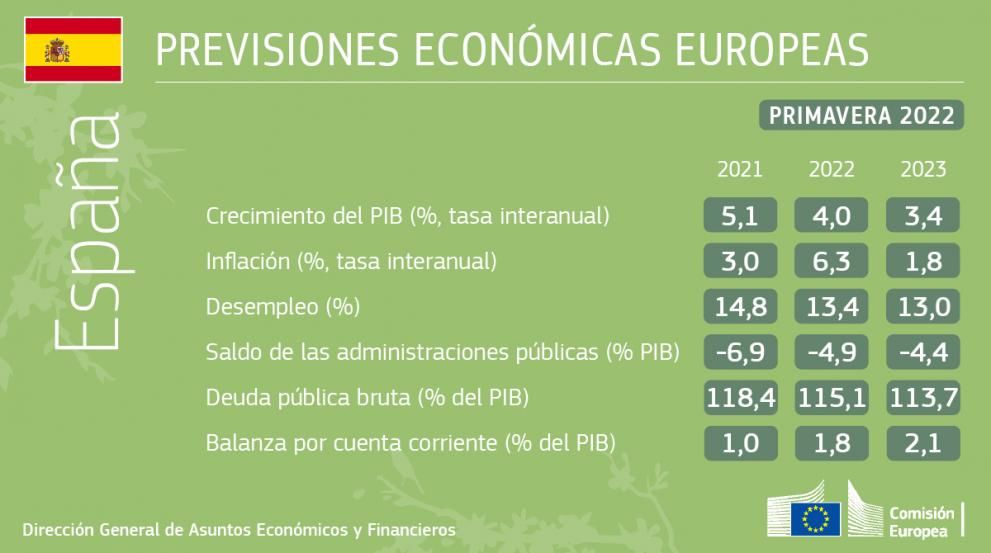The outlook for the EU economy before the outbreak of the war was for a prolonged and robust expansion. But Russia’s invasion of Ukraine has posed new challenges, just as the Union had recovered from the economic impacts of the pandemic.
By exerting further upward pressures on commodity prices, causing renewed supply disruptions and increasing uncertainty, the war is exacerbating pre-existing headwinds to growth, which were previously expected to subside. This has led the European Commission to revise the EU’s growth outlook downwards, and the forecast for inflation upwards.
Slowdown in growth as war exacerbates pre-existing headwinds
EU GDP is projected to remain in positive territory over the forecast horizon, thanks to the combined effect of post-lockdown re-openings and the strong policy action taken to support growth during the pandemic. Namely, the post-pandemic re-opening of contact-intensive services, a strong and still improving labour market, lower accumulation of savings and fiscal measures to offset rising energy prices are set to support private consumption. Investment is set to benefit from the full deployment of the Recovery and Resilience Facility and the implementation of the accompanying reform agenda.
Real GDP growth in both the EU and the euro area is now expected at 2.7% in 2022 and 2.3% in 2023, down from 4.0% and 2.8% (2.7% in the euro area), respectively, in the Winter 2022 interim Forecast. The downgrade for 2022 must be read against the background of the growth momentum gathered by the economy in spring and summer last year, which adds around 2 percentage points to the annual growth rate for this year. Output growth within the year has been reduced from 2.1% to 0.8%.
The main hit to the global and EU economies comes through energy commodity prices. Although they had already increased substantially before the war, from the low levels recorded during the pandemic, uncertainty about supply chains has pressured prices upwards, while increasing their volatility. This is true for food and other basic goods and services, with households’ purchasing power declining.
War-induced logistics and supply chain disruptions, as well as rising input costs for a broad array of raw materials, add to the disturbances in global trade caused by the drastic COVID-19 containment measures still applied in parts of China, weighing on production.

La Eurocámara respaldará un tipo mínimo global del impuesto de sociedades
|
Energy prices drive inflation to record highs
Inflation has been picking up momentum since early 2021. From 4.6% year-on-year in the last quarter of 2021 it went up to 6.1% in the first quarter of 2022. Headline inflation in the euro area surged to 7.5% in April, the highest rate in the history of the monetary union.
Inflation in the euro area is projected at 6.1% in 2022, before falling to 2.7% in 2023. For 2022 as a whole, this represents a considerable upward revision compared to the Winter 2022 interim Forecast (3.5%). Inflation is expected to peak at 6.9% in the second quarter of this year and decline gradually thereafter. For the EU, inflation is expected to increase from 2.9% in 2021 to 6.8% in 2022, and fall back to 3.2% in 2023. Average core inflation is projected above 3% in 2022 and 2023 in both the EU and the euro area.
Más información: Comisión Europa – Comunicado de prensa
Economic forecast for Spain
The GDP growth (%, year-on-year rate) forecast by the European Commission for Spain for this year 2022 is 4%, and for the year 2023 the forecast is for a growth of 3.4%.
This will place the Spanish economy as the fourth fastest growing in the EU as a whole this year, only surpassed by Ireland, Malta and Portugal, the country with the highest growth.
As for inflation, inflation is forecast to peak in mid-2022 and average 6.3% in 2022 in Spain. By 2023, inflation in Spain will contract to 1.8%.
According to Brussels forecasts, the unemployment rate in Spain will stand at 13.4% in 2022 and 13% the following year.
Regarding Spain’s debt levels, the European Commission has estimated that it will stand at 115.1% of GDP in 2022, and 113.7% of GDP in 2023.








Leave a Reply